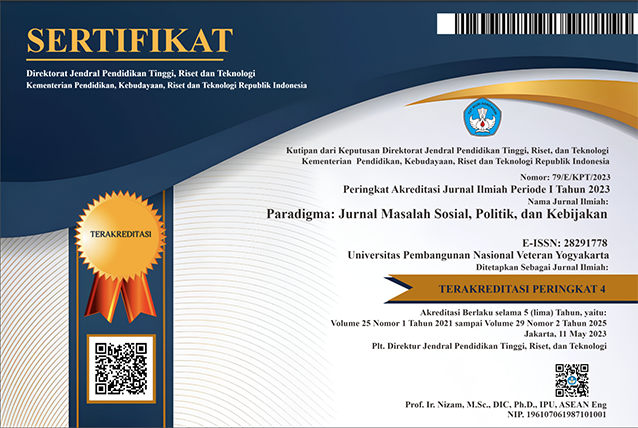Penggunaan Instagram Terhadap Perilaku Flexing Mahasiswa Universitas Muhammadiyah Riau Pekanbaru
DOI:
https://doi.org/10.31315/paradigma.v28i2.12287Keywords:
Instagram, Behavior, FlexingAbstract
This article discusses the influence of Instagram use on flexing behavior in students. Flexing behavior as a form of showing off possessions on social media aims to gain appreciation, honor, and social status where the wealth owned is not necessarily true of the ownership of one's own assets. The method used is descriptive of quantity. This research uses secondary data techniques by analyzing photos or videos on social media based on criteria. The results showed that the correlation analysis between social media variables and flexing behavior was (r) = 0.347, then the level of influence strength between variables was in the interval 0.40 – 0.599, This means that there is an influence in the medium category between social media on flexing behavior in students of the University of Muhammadiyah Riau in Pekanbaru.
References
Achmadi Fuad Purbatin. 2020. Perilaku Hedonis dalam Perayaan Idul Fitri Perspektif Hukum Ekonomi Syariah. Tesis IAIN Purwokerto
Agustianti, S., & Amir, R. (2020). Fenomena Social climber Mahasiswa dalam Pandangan Hukum Islam; Studi Kasus Mahasiswa Fakultas Syariah dan Hukum. Shautuna: Jurnal Ilmiah Mahasiswa Perbandingan Mazhab Dan Hukum.
Akbar, M. A. (2019). Buku ajar konsep-konsep dasar dalam keperawatan komunitas. Deepublish.
Arifenda, Dafa putri, dkk.2020.Manajemen Pengelolaan Media Sosial untuk Publishing Film di Pehagengsi. Jurnal Audiens Vol. No.2.September 2020.
Arlinah, dkk.2019. Penggunaan Media Sosial Dikalangan Mahasiswa Fakultas Ilmu Budaya Universitas Khairun. Jurnal Kebudayaan dan kesejarahan Vol. VI, No. 2, Tahun 2019
Avianto, B. N. (2022). Filsafat Administrasi. Bumi Aksara.
Azwar, Saifuddin.2004.Metode Penelitian. Yogyakarta: Pustaka Pelajar
Darmalaksana, W. (2022). Studi Flexing dalam Pandangan Hadis dengan Metode Tematik dan Analisis Etika Media Sosial. Gunung Djati Conference Series, 8, 412–427.
Mahyuddin, M. (2019). Social Climber Dan Budaya Pamer: Paradoks Gaya Hidup Masyarakat Kontemporer. Jurnal Kajian Islam Interdisipliner, 2(2).
Musman, A. (2020). The Power of IKIGAI: Dan Rahasia Hidup Bahagia ala Orang-orang di Dunia. Anak Hebat Indonesia.
Nugrahani, F., & Hum, M. (2014). Metode penelitian kualitatif. Solo: Cakra Books, 1(1).
Rahadi, D. R. (2017). Perilaku pengguna dan informasi hoax di media sosial. Jurnal Manajemen Dan Kewirausahaan, 5(1), 58–70.
Rahardjo, S. (2009). Hukum dan Perilaku: hidup baik adalah dasar hukum yang baik. Penerbit Buku Kompas.
Raho, B. (2016). Sosiologi. Penerbit Ledalero.
Saskia, Caroline, dkk. 2023. 15 Medsos Favorit Orang Indonesia, Nomor 1 Bukan Instagram.https://tekno.kompas.com/read/2023/02/14/10300097/15-medsos-favorit-orang-indonesia-nomor-1-bukan-instagram (Diakses tgl 16/1/2023, jam 12:23 wib).
Downloads
Published
How to Cite
Issue
Section
License
The manuscript submitted to Paradigma: Jurnal Masalah Sosial, Politik, dan Kebijakan journals are released under the license of Creative Commons Attribution-Non Commercial- ShareAlike (CC BY SA) if and when the article is accepted for publication.
We declare that:
- This paper has not been published in the same form elsewhere.
- It will not be submitted anywhere else for publication prior to acceptance/rejection by this Journal.
- A copyright permission is obtained for materials published elsewhere and which require this permission for reproduction.
Retained Rights/Terms and Conditions
Authors retain all proprietary rights to the published works, such as (but not limited to) the following rights:
- Copyright and other proprietary rights relating to the article, such as patent rights,
- The right to use the substance of the article in own future works, including lectures and books,
- The right to reproduce the article for own purposes,
- The right to self-archive the article
The right to enter into separate, additional contractual arrangements for the non-exclusive distribution of the article's published version (e.g., post it to an institutional repository or publish it in a book), with an acknowledgment of its initial publication in this journal Paradigma: Jurnal Masalah Sosial, Politik, dan Kebijakan



